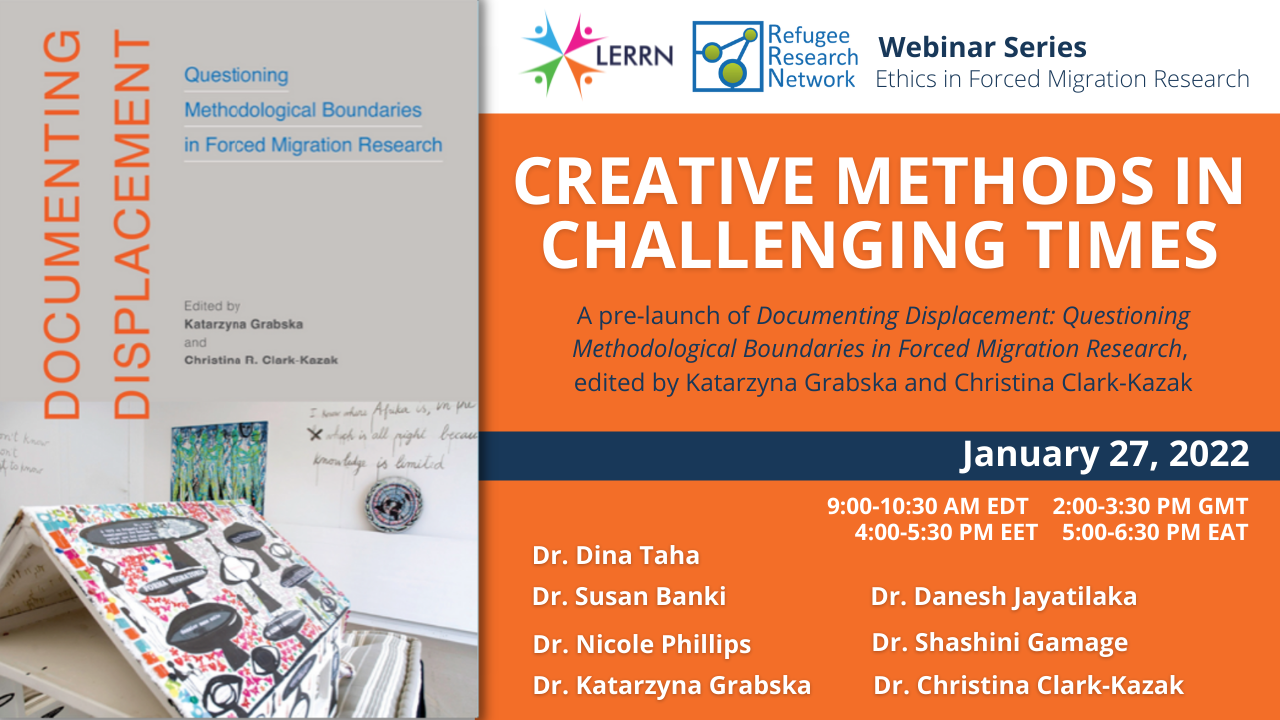The third webinar in a series on Ethics in Forced Migration Research, co-hosted by the Local Engagement Refugee Research Network (LERRN) and the Refugee Research Network (RRN), focused on creative research methods in challenging times. More than 200 people in 46 countries registered for this interactive pre-launch of the forthcoming book Documenting Displacement: Questioning Methodological Boundaries in Forced Migration Research. The co-editors of the book, Katarzyna Grabska and Christina Clark-Kazak, gave an overview of the chapters and moderated the question period.
During the workshop, Susan Banki and Nicole Phillips introduced their collaborative approach that aims to bring joy and whimsy to the research process. The Multimedia Package (MMP) approach begins by inviting participants to mark places that are important to them on a map and by asking participants questions about what home is and what it looks like to them. During the workshop, participants shared their answers in the chat. In this research method, the answers to these prompts are not the actual data for the research, but a way to stimulate a conversation and to help research participants become more comfortable and enjoy the research process. Phillips explained that one of the challenges in research with refugee populations is that they are often over-researched. At first, participants give responses they think the researchers want to hear and it takes time and persistence to make them feel comfortable and in control.
Next, Danesh Jayatilaka and Shashini Gamage shared their research method of mobility mapping videos. Wanting to record stories of urban displacement, they invite research participants to share their life stories and the places to which those memories are linked. The final products are individual story videos in which participants hand-draw a map and mark milestone memories on it while narrating their thoughts freely. The instructions are open to interpretation so participants can tell their stories however they wish. Silence plays a key role. Jayatilaka and Gamage have used these videos to share with policy makers the stories of people who have experienced urban displacement.
Another chapter author, Andrea Rodríguez Sánchez, shared one of her sound postcards that gave research participants the opportunity to capture sounds that represented their lives before and after displacement in Colombia. Dina Taha spoke about her chapter that looks at the traditional methodology of qualitative interviews through the lenses of decolonization and critical reflexivity. She urged us to ask if research questions are rooted in stereotypical conceptions or binaries. Critical reflexivity can reveal the vulnerability of the researcher and show when to embrace it, as well as help navigate the delicate balance between researcher and participant control in an interview. Taha noted that arts-based research methods give more control to research participants but are still designed by the researchers.
Finally, Adnan Al Mhamied, one of the chapter co-authors, shared the challenges of being both a researcher and a community member. In his research, when refugee fathers who have experienced war would share their vulnerabilities, they sometimes said “you know what I’m saying” instead of elaborating, given his similar experiences as a community member. He reflected on how, at the end of the day, it is a researcher’s job to deliver high quality data, even if it works against personal bias.
You can use the discount code “MQSP” to receive 20 percent off your copy of Documenting Displacement until April 30, 2022.
Click here to watch a full recording of this workshop.
Stay tuned for the next two webinars in the series in March about exploring positionality in refugee research and about challenging funding structures.
This report was prepared by: Kail Schlachter, LERRN Project Writer and Rawan Youssef, LERRN Strategic Communications Project Officer.
The LERRN-RRN Webinar Series on Ethics in Forced Migration Research is coordinated by Rachel McNally, LERRN Knowledge Mobilization and Translation Officer. For further information or ideas please contact us here.
